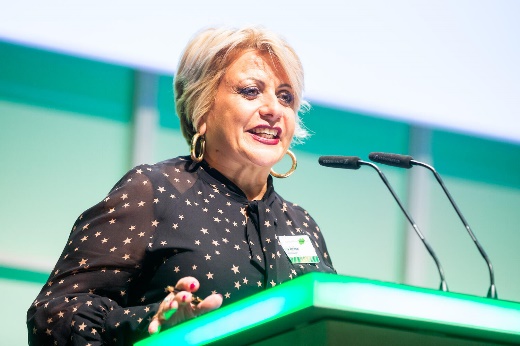
Statement of the European Commission
Group on Earth Observations – GEO Global Forum 2025 & GEO-20 Plenary
Statement of the European Commission
The European Commission is maintaining the European Union’s strong support to the Group on Earth Observations, contributing not only directly to the GEO’s Secretariat Trust Fund, but has also invested over the past two years over 200 million Euros through its Research and Innovation Framework Programme, Horizon Europe in more than 40 projects related to GEO, in various domains such as biodiversity, space, agriculture, climate etc. In addition, the European Commission support GEO WP activities such as the GEO Blue Planet through EO4OceanObs 2.0 that contributes to the overall governance of the GEO Blue Planet Initiative.
The European Commission helps as well EuroGEO, the European regional initiative of GEO, by funding the EuroGEOSec project to develop a fully operational and sustainable EuroGEO Secretariat, aiming to further the design of a European digital ecosystem that supports access and interoperability of EO data, providing benefits to businesses, citizens and scientists/researchers, promote the GEO vision in Europe to realize a future where decisions and actions are informed by evidence, while supporting the consolidation of national GEO management structures across Europe.
The EuroGEO Secretariat organized in October 2024, in Krakow, Poland, the annual EuroGEO workshop, attended by more than 240 delegates over 3 days, engaging a larger community, Copernicus entrusted entities and European Commission services into designing & chairing sessions, with strong engagement of the private sector. Discussions in the workshop shaped the mission and vision for the EuroGEO Action Groups and the role of EuroGEO vis a vis the National Coordination mechanisms/National GEOs, initiating synergies around GEO Focus Areas.
Copernicus, representing a major contribution to GEO and broader Sustainable Development Goals, powers a wide range of free and open downstream services and plays a key role in advancing the global Earth observation ecosystem, translating space data into real-world impact, addressing key societal priorities such as environmental monitoring, climate change, and disaster management. Copernicus fosters a culture of innovation, enabling policymakers and the public to make informed decisions.
The European Commission's Joint Research Centre, with international partners, embraces the shift from Earth Observation products and services to Earth Intelligence, recognizing the critical role that this transformation will play in addressing the world's most pressing challenges, such as climate change and sustainable development.
The Africa-EU Space Partnership Programme, a Global Gateway flagship initiative, launched by the Directorate General for International Partnerships of the European Commission, leverages the power of space technologies to drive sustainable development, enhance climate resilience, and foster innovation. This initiative not only advances Africa's green and digital transition but also empowers its private sector and institutions to shape a more resilient society.
As already mentioned, Horizon Europe, the European Union’s Research and Innovation framework programme, is funding numerous projects, related to GEO, advancing the use and exploitation of Earth Observation data, in building impactful services in various domains.
EO4EU project, using Artificial Intelligence technology and extended reality, develops an easy-to-use interface that includes several tools for users to fully capitalize on Earth Observation data, contributing also to their FAIRness.
Arctic Passion is involving indigenous communities and local people with researchers in observations benefiting from the related Earth Observation services in the Arctic.
OEMC embraces the use and extension of open-source software, open reproducible procedures and data sharing, allowing users to improve existing data and services and develop their own, building on existing platforms. OEMC also produced several new data sets, such as land degradation hot spots supporting the United Nations’ Convention to Combat Desertification, or datasets used to map drivers of deforestation across Africa, developing as well a computational framework employed to produce cloud-free, data sets with applications including land cover analysis and crop-type mapping. OEMC currently has more than 20 monitors with pilot use cases such as the ‘World drought monitor’, ‘EU biodiversity monitor’ and ‘Tropical deforestation monitor’ (Ethiopia) in which users are at the centre of monitors’ design, and applications are often developed in close collaboration.
USAGE project is paving the way to create urban data spaces addressing problems identified in the Green Deal, focusing on the use of open Earth Observation data to characterize urban heat islands, and combine such data with other data sources to determine how they affect population in urban areas.
The European Environment Agency, being actively engaged in GEO and EuroGEO data sharing activities, launched in 2024, with funding received by the European Commission, a three-years project, ‘Enhancing the access to in situ Earth observation data in support of climate change adaptation policies and activities’, contributing to the GEO Data and Knowledge Working Group, promoting open data sharing and sound data management practices across the Earth observation community.
In addition the European Environment Agency supported the development of GEO success stories that demonstrate the value of implementing open data principles, contributed actively to the formulation of the post-2025 GEO In-Situ Data Strategy and continues the development of the Geospatial In-situ Requirements Database (G-reqs), a tool to document and manage in situ data user needs across the GEO Work Programme, building on its role as coordinator of the Copernicus In-Situ Component. The project also includes the development of practical showcases as for example, the development of a methodology to calculate a Building Energy Performance Index at municipal level.
